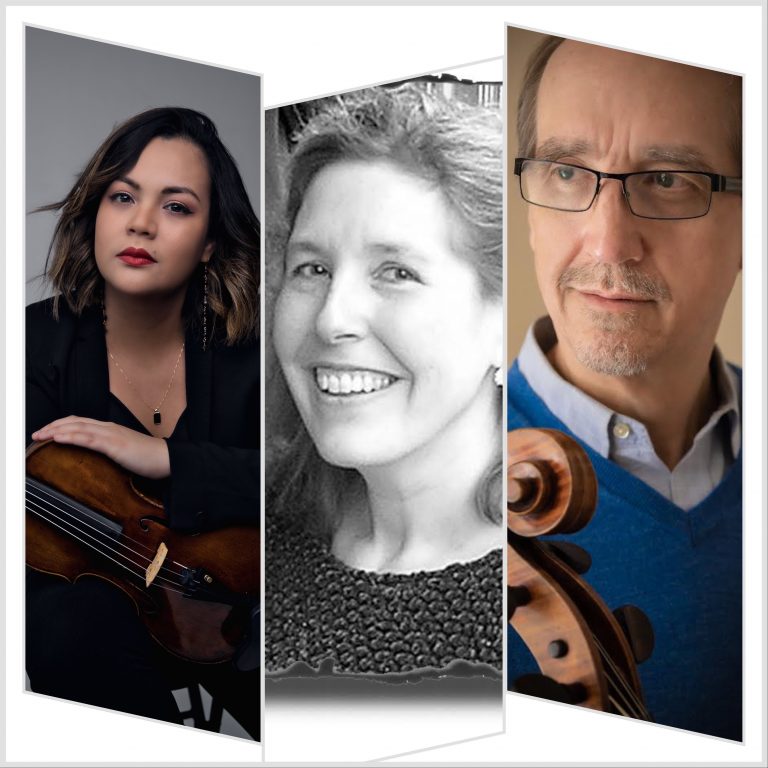MSO Violinist Guests With Prometheus Trio
With works by Beethoven, Dvořák, Copland and contemporary Urayaguan composer Miguel del Aguila.

Allison Lovera, Stefanie Jacob and Scott Tisdel. Photos courtesy of the Milwaukee Symphony Orchestra.
On Monday, the Prometheus Trio plays two early but familiar-sounding piano trios by Ludwig van Beethoven and Antonín Dvořák and two intriguing, unfamiliar works by Aaron Copland and Miguel del Aguila.
Founding members pianist Stefanie Jacob and cellist Scott Tisdel will be joined by guest violinist Allison Lovera as the Trio searches for a new regular violinist.
Lovera joined the Milwaukee Symphony Orchestra this fall, bringing substantial experience, including playing with the Sphinx Symphony Orchestra, Memphis Symphony, Chicago Sinfonietta, Civic Orchestra of Chicago, Grant Park Music Festival and the Minneapolis Symphony Orchestra. Her career began in Venezuela, where she was a part of “El Sistema,” a comprehensive program to involve youth in classical music. She toured with the Simon Bolivar Orchestra led by Gustavo Dudamel. Impressive solo concerto performances and recitals may be found on YouTube.
“She’s terrific—a fiery, gutsy player who is also able to play delicately. Huge range! And not shy about expressing her opinions, which we appreciate,” said Jacob.
The program opens with a substantive trio by Ludwig van Beethoven. Joseph Haydn has been credited with defining the classical piano trio, but Beethoven took the trio to the next level, expanding the format and treating the form as a more serious format for chamber music. His early Trio in G Major, Op. 1, No. 2 (1793-1794) offers a larger four-movement frame. Notably, Beethoven chose to publish this set of Piano Trios as Opus 1, his recognition that the works were worthy of publication.
Two smaller works explore very different styles:
Three-time Grammy-nominated American composer Miguel del Aguila was born in Montevideo, Uruguay. He has established himself among his generation’s most distinctive and highly regarded composers in more than 130 works that couple drama and driving rhythm with nostalgic nods to his South American roots.
The Prometheus will play Aguila’s Tango Trio, Op. 71 (2002). The violin and cello exchange a melodramatic melody. The piano provides the rhythm – which varies substantially. Aguila writes, “The piano often provides the sharp rhythmic beat characteristic of this dance, but occasionally blurs the beat with turbulent, virtuosic arpeggios. The tango rhythmic pattern, present through most of the work, undergoes several tempo meter transformations, becoming at times highly syncopated and varied through asymmetrical groupings within the measure.” This energetic work is not a tango meant for dancing.
Early in his career, Aaron Copland was influenced by European Modernist styles and experimented with striking rhythms and discordant sounds. Vitebsk: Study on a Jewish Theme (1929) was one of few Jewish-influenced works Copland wrote. The theme is derived from a Hassidic folk song, Mipnei Ma, the first line of which roughly translates as “Because of what has the soul fallen.” The work also includes a fleeting reference to an important part of the Jewish liturgy, Kol Nidrei. Full of variety, passages invoke demonic possession, jazzy syncopations, and Klezmer-like abandon, as well as a dominant sense of sadness. Though Mipnei Ma is typically sung in a bright dance tempo, Copland chooses to set the song much slower, as a lament.
The highlighted closing work features a seemingly familiar trio by Antonín Dvořák. Although an early work, Dvořák’s Trio in B-flat Major, Op. 21 (1875) is already recognized as uniquely Dvořák. Critic Kai Christiansen observes that this early work was already “showing Dvořák’s gifts for lyricism, color, and vivid contrast within a fresh, natural style.” Christiansen’s detailed review explores the structure of the Trio. I am drawn to his poetic descriptions. Christiansen highlights “restless transitions, two lyrical themes, and a motive-rich development” in the opening movement, “elegy expands into reverie, full of longing” in the Adagio, ” and “a duple meter dance with offbeat accents evoking the Bohemian polka” in the scherzo. And in the finale, Christiansen describes “a rousing finale, mysterious minor keyed introduction, canonic imitation, a haunting adagio elegy, (introducing) fresh color and bright harmonies, and a further transformation of the mystery motive into happy laughter.”
Prometheus Trio programs offer a potpourri of interesting music rather than a fixed theme. This evening will effectively contrast piano trio styles, from the sophisticated drama of Beethoven to the color and national references of Dvořák, the Modernist style of early Copland and Aguila’s contemporary styling of tango rhythms.
The concert, Monday, Dec. 4 at 7:00 p.m., will be heard in the acoustically ideal environment of the Helen Bader Recital Hall at the Wisconsin Conservatory of Music, 1584 N. Prospect Ave. Tickets may be purchased online or at the door. Complimentary parking is available at Milwaukee Eye Care, 1684 N. Prospect Ave..
The Prometheus Trio will perform its third concert of the season on Monday, Feb. 5, 2024, featuring works of Haydn, Moravec, and Brahms. Guest violinist Emmy Tisdel will make that concert a family affair (It is unlikely that Emmy is auditioning to join the Trio, however, as she continues a blossoming career in Arizona).
If you think stories like this are important, become a member of Urban Milwaukee and help support real, independent journalism. Plus you get some cool added benefits.
Preview
-
A Sacred Choir, 70 Voices Strong
 Dec 14th, 2025 by Martha Brown
Dec 14th, 2025 by Martha Brown
-
Prometheus Trio Goes Bohemian
 Dec 3rd, 2025 by Martha Brown
Dec 3rd, 2025 by Martha Brown
-
Present Music Offers New Choral Works
 Nov 20th, 2025 by Michael Barndt
Nov 20th, 2025 by Michael Barndt



















